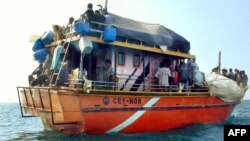SYDNEY —
Refugee specialists in Sri Lanka say Australia can expect more refugee boats to reach its coastline following the arrival this week of asylum seekers at a busy port north of Perth. Australia’s conservative opposition is accusing the Labor government of losing control of the nation’s borders. In Melbourne, more than 25 asylum seekers are continuing a hunger strike that began on Monday.
The government in Canberra has ordered a review into how a boat carrying 66 suspected asylum seekers from Sri Lanka managed to make it to the Australian mainland without being detected.
It is only the second asylum vessel to reach the mainland in the last five years.
Immigration officials say it is an unusual case. An investigation is underway that will examine whether Australian authorities need to change the way they patrol the Indian Ocean that surrounds the country’s northwestern coastline.
Opposition lawmakers say the arrival of the boat is a “disaster” for the nation’s border protection strategy. They insist Australia’s vast northwest shoreline is poorly protected and expect more asylum boats to try to reach the mainland.
That is a view shared by Jehan Perera from the Sri Lankan National Peace Council.
Perera said the arrival of the boat in the Western Australian port of Geraldton will encourage other asylum seekers to attempt the long sea voyage.
“It would serve as an incentive. I mean the fact that some got through, it would send a message to others who are also thinking of leaving Sri Lanka that way to try their luck," he said.
Allegations of political persecution drive many Tamil asylum seekers to try to reach Australia.
Joint efforts by the Australian and Sri Lankan governments have reduced the number of asylum seeker boats attempting to cross the Indian Ocean.
In the past couple of years, a steady flow of asylum seekers arriving in Australia’s northern waters has prompted the government to reopen offshore processing camps in Papua New Guinea and Nauru.
In Melbourne, refugees at the Broadmeadows Detention Facility are entering a fourth day of a hunger strike. Most are Tamils, who are facing indefinite detention after Australia’s intelligence agencies classified them a threat to national security.
But Trevor Grant, from the Tamil Refugee Council, believes the detainees have been unfairly labeled as extremists.
“Some of them have been detained as long as four years. They are under indefinite detention," Grant remarked. "The high court said last year that is illegal. Everybody agrees that it is an impossible situation, but for some reason the minister for immigration, who has the power to release them, refuses to do so. We believe it is because he fears the terrorism bogey, which is quite ridiculous, and to use people’s lives like this for political ends is disgraceful, as far as we are concerned.”
Australia’s Immigration Department says the refugees have access to food, water and medical treatment at all times.
As the hunger strikers promise to continue their protest, Immigration Minister Brendan O'Connor says he will not bow to pressure.
The government in Canberra has ordered a review into how a boat carrying 66 suspected asylum seekers from Sri Lanka managed to make it to the Australian mainland without being detected.
It is only the second asylum vessel to reach the mainland in the last five years.
Immigration officials say it is an unusual case. An investigation is underway that will examine whether Australian authorities need to change the way they patrol the Indian Ocean that surrounds the country’s northwestern coastline.
Opposition lawmakers say the arrival of the boat is a “disaster” for the nation’s border protection strategy. They insist Australia’s vast northwest shoreline is poorly protected and expect more asylum boats to try to reach the mainland.
That is a view shared by Jehan Perera from the Sri Lankan National Peace Council.
Perera said the arrival of the boat in the Western Australian port of Geraldton will encourage other asylum seekers to attempt the long sea voyage.
“It would serve as an incentive. I mean the fact that some got through, it would send a message to others who are also thinking of leaving Sri Lanka that way to try their luck," he said.
Allegations of political persecution drive many Tamil asylum seekers to try to reach Australia.
Joint efforts by the Australian and Sri Lankan governments have reduced the number of asylum seeker boats attempting to cross the Indian Ocean.
In the past couple of years, a steady flow of asylum seekers arriving in Australia’s northern waters has prompted the government to reopen offshore processing camps in Papua New Guinea and Nauru.
In Melbourne, refugees at the Broadmeadows Detention Facility are entering a fourth day of a hunger strike. Most are Tamils, who are facing indefinite detention after Australia’s intelligence agencies classified them a threat to national security.
But Trevor Grant, from the Tamil Refugee Council, believes the detainees have been unfairly labeled as extremists.
“Some of them have been detained as long as four years. They are under indefinite detention," Grant remarked. "The high court said last year that is illegal. Everybody agrees that it is an impossible situation, but for some reason the minister for immigration, who has the power to release them, refuses to do so. We believe it is because he fears the terrorism bogey, which is quite ridiculous, and to use people’s lives like this for political ends is disgraceful, as far as we are concerned.”
Australia’s Immigration Department says the refugees have access to food, water and medical treatment at all times.
As the hunger strikers promise to continue their protest, Immigration Minister Brendan O'Connor says he will not bow to pressure.










